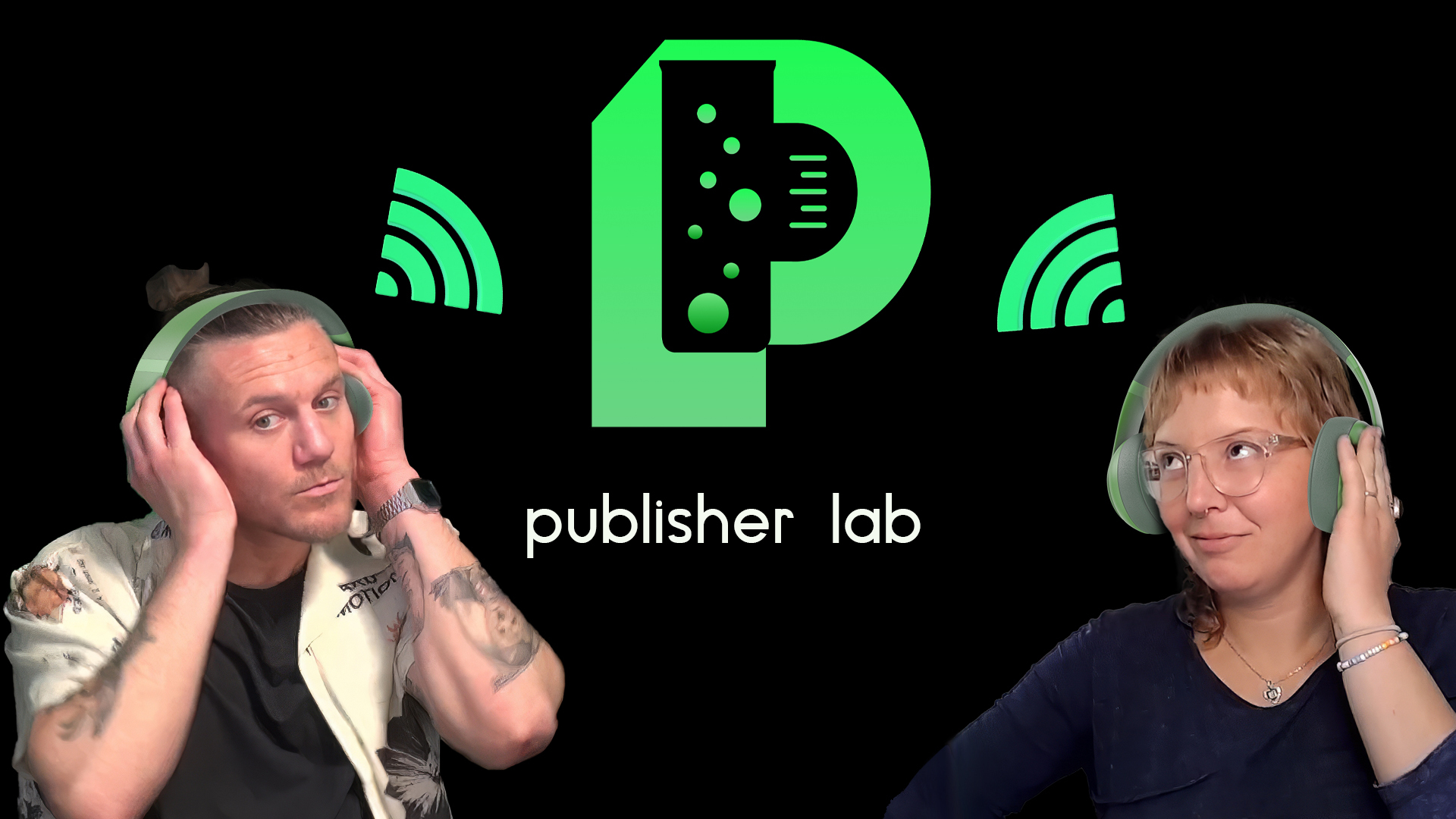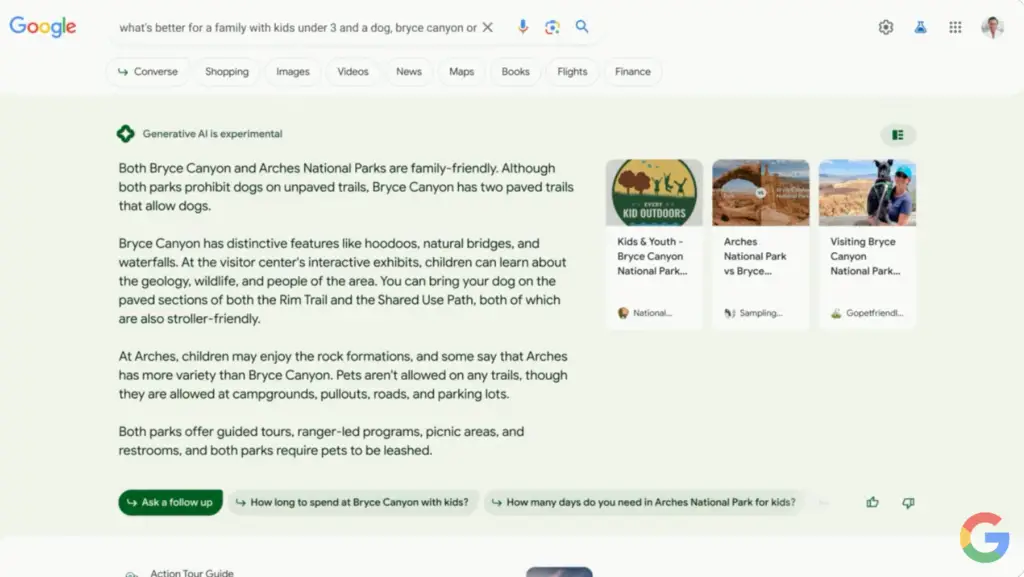
The Publisher Lab: AI makes us rethink authenticity, Microsoft’s AI Chat Monetization, & changes to Google Search
Get helpful updates in your inbox
Welcome to another week of the Publisher Lab!
This week, Tyler Bishop and Whitney Wright podcast remotely for the first time. Any remote podcasting tips you have are welcome and can be submitted here.
Tyler and Whitney dive into authenticity and A, Microsoft adding monetization benefits to publishers inside ChatGPT, and upcoming changes to Google Search.
Authenticity and generative AI
With generative AI’s growing popularity, authenticity is becoming increasingly important as it also becomes rarer.
Authenticity doesn’t only reinforce trust between the audience and the creator, but it has positive effects on the brain. Neuroscience research has shown that believing a piece of art is authentic actually activates the brain’s reward centers in ways that viewing something a person knows is forgery doesn’t. When something is authentic, our brain reacts positively.
Up until recently, there has always been a general assumption that creating original content took skill, and that created trust in the publisher and their expertise. This is increasingly not the case with the rise of generative AI and its increased ability to write. Generative AI relies on taking advantage of something called “categorical authenticity,” or when something looks like the real thing (i.e. a restaurant in Japan offering authentic Neopolitan pizza). While the pizza is probably really good, unless that chef has lived and studied in Naples, it isn’t quite authentic (and even then, isn’t Neopolitan pizza probably still better in Naples?).
What generative AI does not have is experience. For example, Tyler has spent time in Brazil. Google Maps has multiple route options but the fastest route might not be the safest, depending on what neighborhood you go through. There are safer routes, but taxis may also charge an exorbitant amount. However, Tyler knows that if you chat up a taxi driver, the driver may take you on a safe route on a scooter for only $5, as Brazilians are typically very social and friendly. This is something that only someone with experience would know, like a travel blogger, and that ChatGPT wouldn’t know to recommend. Generative AI can never take the place of wisdom.
The same goes for something like sports news. To just know the score or how the game generally went, you could ask AI to provide that information. But actual news and gossip is only valuable coming from a sports buff or former athlete commenting on the game and the players.
Publishers need to stay informed about what AI is capable of in order to best use it to their advantage and how to compete against it.
Microsoft’s new AI chat monetization
Microsoft recently introduced an advertising solution that will make AI chat experiences monetizable. The creative native advertising experiences would benefit partners, consumers, an advertisers. The Corporate VP of Microsoft Advertising, Kya Sainsbury-Carter, reported that they are trying to drive more traffic and clicks for publishers and partners, not less and that this is a step in that direction. The advertisements will deliver ads that won’t disrupt the user’s experience but match the content and user experience.
Bing currently has over 100 million daily active users and so could provide publishers with a new revenue opportunity and a broader ad audience to advertisers.
The biggest issue that any AI company is going to run into is a copyright issue, so finding ways to make those with the content happy (publishers) makes sense for Microsoft. Any major player in this space is going to do anything they can to mitigate the risk of legal action.
Something like a markdown format would be advantageous for publishers to take advantage of such an opportunity, as it will tell you how well your content is a fit for something like a chatbot. A JSON format makes it really easy for a chatbot to see what your content is about and extract the parts that it needs.
If you can imagine how affiliate links work, it may be like that your content used by the chatbot would work like an affiliate link, where the publisher is paid if a user clicks on the content after reading the answer that the generative AI has extracted from it.
This may be an opportunity for publishers to get in early on this and have their content prepared in such a format, as it is unlikely many other publishers will have thought to do so.
Google I/O announces upcoming changes to Google Search
On Wednesday, May 10, Google held its annual developer conference, Google I/O, to announce upcoming changes to its products and services. More importantly for publishers, the conference revealed some interesting changes to Google Search that will be coming up in 2023.
The changes have been called Project Magi and have a team of over 160 Googlers working full-time on it. The changes will be available for a subset of users in the next month.
According to Google, it will be moving away from the classic “ten blue links” and instead will be releasing a more visual and personable experience in search, in part to appeal to younger audiences that are already invested in apps like TikTok.
Google plans to add AI to its search to focus on web searches that a typical search engine couldn’t answer. In the presentation, such an example is “what’s better for a family with kids under three and a dog, Bryce Canyon or Arches?”

The new search then provided a summarized answer, indicating both are kid-friendly but that Bryce Canyon had two paths that dogs were specifically allowed on. In the AI results, it also provided the top three authorities on the matter (the National Park Service being the top authority, naturally). Under the AI-generated results were the typical list of websites that we have come to expect from search results.
One of the best new features that will come of the new-and-improved Google Search is the option to continue to get more information on a subject without needing to redo your search; you can simply ask for more examples or for examples related to something specific and it will know you’re still searching on the same subject.
Another important thing for publishers to remember is that sometimes, the leading source on a subject isn’t exactly what a user is searching for. For example, health-related searches; while you may sometimes want the World Health Organization’s opinion on some matters, something like intermittent fasting is not the source most people would want to go to learn about intermittent fasting. Most users want a fitness or nutritionist blog. This is one area where being a publisher and having good content is still going to be very important.
Publishers can dial back their concern of search engines just completely eliminating the need for publishers; published content isn’t going anywhere, how it is consumed is is just going to look different than before. The riskiest thing a publisher can do right now is to put their head down and just keep making evergreen content.
Affiliate Gathering 2023
If you’re able to make it, Ezoic is the headline sponsor of the digital publishing event, Affiliate Gathering, being held in York, UK on May 19, 2023. Ezoic is hosting a workshop on AI and video publishing during the event at three convenient times, along with finishing out the day with a session hosted by our very own CCO, John Cole, on the future of digital publishing and sticking with trends that are here to stay.
As always, you can find us at PublisherLab.org to leave a comment or concern. You can listen to the podcast wherever you get your podcasts or find us on our YouTube channel to watch.
Whitney is a former journalist for numerous city-wide newspapers and online media sources and an accomplished digital and creative marketer. She has multiple years of digital publishing expertise and contributes regularly to all of Ezoic's content sources.
Featured Content
Checkout this popular and trending content

Ranking In Universal Search Results: Video Is The Secret
See how Flickify can become the ultimate SEO hack for sites missing out on rankings because of a lack of video.
Announcement

Ezoic Edge: The Fastest Way To Load Pages. Period.
Ezoic announces an industry-first edge content delivery network for websites and creators; bringing the fastest pages on the web to Ezoic publishers.
Launch

Ezoic Unveils New Enterprise Program: Empowering Creators to Scale and Succeed
Ezoic recently announced a higher level designed for publishers that have reached that ultimate stage of growth. See what it means for Ezoic users.
Announcement
